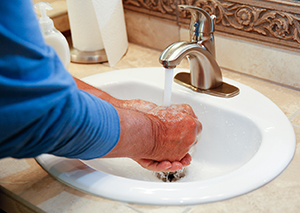Caring for Your PD Catheter and Exit Site
Your healthcare provider will teach you how to care for your catheter and exit site. Proper cleanliness and care are important to prevent infection. If an infection occurs, the catheter may have to be taken out. A new one will have to be put in at a later date.
During healing
Your skin will heal in 1 or 2 weeks. During this time, follow your healthcare provider's instructions. Don't get your catheter or exit site wet until your healthcare provider says you can.
After healing
-
Always scrub your hands for 20 seconds before and after touching your catheter.
-
Keep your catheter clean and covered.
-
Anchor or secure the catheter as instructed. Don't let clothes or things you carry rub or pull at it.
-
Always do exchanges in a clean place.
-
Never use a cloudy or leaking bag of dialysate.
-
Wear a mask while doing exchanges.
-
Don't swim in lakes, streams, rivers, or public pools. Also don't soak in baths or hot tubs. It's OK to go into the ocean or a chlorinated private pool. The catheter and exit site should be covered with a clear, waterproof dressing or colostomy bag. Routine exit site care should be done after swimming.
-
Make sure all caretakers and healthcare providers clean their hands before and after caring for you or your catheter access and exit site. They should wash their hands with soap and water. Or they can use an alcohol-based hand sanitizer.

When to call your healthcare provider
Call your healthcare provider if you have any of these problems:
-
Bleeding or draining from the exit site
-
Red, painful, or warm skin around the catheter
-
Fever of 100.4°F ( 38°C) or higher, or as advised by your provider
-
Pain in your belly (abdomen)
-
Cloudy or bloody dialysate when it drains from your belly
-
Incomplete draining of dialysate
Important numbers
Write the names and numbers of your healthcare providers below. Or program them into your cellphone. You need to know how to get in touch with them. Make sure you know how to reach them even after hours and on weekends and holidays.
Doctor:
Name ___________________ Phone ___________________
Surgeon:
Name ___________________ Phone ___________________
Dialysis Center:
Name ___________________ Phone ___________________
How daily issues affect your health
Many things in your daily life impact your health. This can include transportation, money problems, housing, access to food, and child care. If you can’t get to medical appointments, you may not receive the care you need. When money is tight, it may be difficult to pay for medicines. And living far from a grocery store can make it hard to buy healthy food.
If you have concerns in any of these or other areas, talk with your healthcare team. They may know of local resources to assist you. Or they may have a staff person who can help.